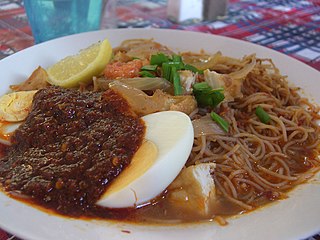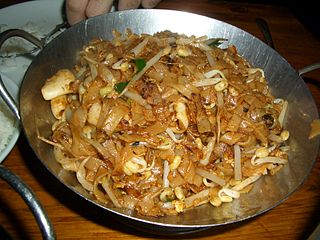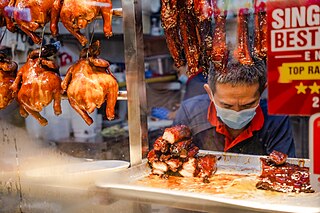
Malaysian cuisine consists of cooking traditions and practices found in Malaysia, and reflects the multi-ethnic makeup of its population. The vast majority of Malaysia's population can roughly be divided among three major ethnic groups: Malays, Chinese and Indians. The remainder consists of the indigenous peoples of Sabah and Sarawak in East Malaysia, the Orang Asli of Peninsular Malaysia, the Peranakan and Eurasian creole communities, as well as a significant number of foreign workers and expatriates.

Laksa is a spicy noodle dish popular in Southeast Asia. Laksa consists of various types of noodles, most commonly thick rice noodles, with toppings such as chicken, prawns or fish. Most variations of laksa are prepared with a rich and spicy coconut curry soup or a broth seasoned with asam.

Hokkien mee, literally "Fujian noodles", is a series of related Southeast Asian dishes that have their origins in the cuisine of China's Fujian (Hokkien) province.
Tiong Bahru is a housing estate and subzone region located within Bukit Merah planning area, in the Central Region of Singapore. Tiong Bahru was constructed in the 1920s by the Singapore Improvement Trust, the predecessor to the Housing Development Board (HDB) and an entity of the British colonial authority providing mass public housing in Singapore and is the oldest housing estate in Singapore.

Singaporean cuisine is derived from several ethnic groups in Singapore and has developed through centuries of political, economic, and social changes in the cosmopolitan city-state.

Mee siam is a dish of thin rice vermicelli of hot, sweet and sour flavours, originated in Penang but popular among the Malay and Peranakan communities throughout Peninsular Malaysia and Singapore, although the dish is called "Siamese noodle" in Malay and thus appears to be inspired or adapted from Thai flavours when Thailand was formerly known as Siam. Mee siam is related to kerabu bee hoon although there is a significant difference in the recipe.

Malaysian Chinese cuisine is derived from the culinary traditions of Chinese Malaysian immigrants and their descendants, who have adapted or modified their culinary traditions under the influence of Malaysian culture as well as immigration patterns of Chinese to Malaysia. Because the vast majority of Chinese Malaysians are descendants of immigrants from southern China, Malaysian Chinese cuisine is predominantly based on an eclectic repertoire of dishes with roots from Fujian, Cantonese, Hakka and Teochew cuisines.

Penang cuisine is the cuisine of the multicultural society of Penang, Malaysia. Most of these cuisine are sold at road-side stalls, known as "hawker food" and colloquially as "muckan carts". Local Penangites typically find these hawker fares cheaper and easier to eat out at due to the ubiquitousness of the hawker stalls and that they are open for much of the day and night. Penang island. On February 22, 2013, Penang was ranked by CNN Travel as one of the top ten street food cities in Asia. Penang has also been voted by Lonely Planet as the top culinary destination in 2014.

Ipoh has a significant food scene with many hawker centres and restaurants. It has dishes derived from Malay, Chinese and Indian cuisine. In recent years, Ipoh has seen an increase in international restaurants, bars and gastropubs which have become popular with locals and tourists.

Curry mee is a Maritime Southeast Asian spicy noodle soup garnished with various toppings. In Johor and Singapore, it is sometimes called curry laksa. Numerous variants of the dish, including preparations with a drier or thicker gravy, exist in both the countries of Malaysia and Singapore.

Chinese Indonesian cuisine is characterized by the mixture of Chinese with local Indonesian style. Chinese Indonesians, mostly descendant of Han ethnic Hokkien and Hakka speakers, brought their legacy of Chinese cuisine, and modified some of the dishes with the addition of Indonesian ingredients, such as kecap manis, palm sugar, peanut sauce, chili, santan and local spices to form a hybrid Chinese-Indonesian cuisine. Some of the dishes and cakes share the same style as in Malaysia and Singapore, known as Nyonya cuisine by the Peranakan.

Rice vermicelli is a thin form of noodle. It is sometimes referred to as "rice noodles" or "rice sticks", but should not be confused with cellophane noodles, a different Asian type of vermicelli made from mung bean starch or rice starch rather than rice grains themselves.

Fried noodles are common throughout East Asia, Southeast Asia and South Asia. Many varieties, cooking styles, and ingredients exist.

Rice noodles are noodles made with rice flour and water as the principal ingredients. Sometimes ingredients such as tapioca or corn starch are added in order to improve the transparency or increase the gelatinous and chewy texture of the noodles. Rice noodles are most common in the cuisines of China, India and Southeast Asia. They are available fresh, frozen, or dried, in various shapes, thicknesses and textures. Fresh noodles are also highly perishable; their shelf life may be just several days.

Singapore-style noodles is a dish of stir-fried cooked rice vermicelli, curry powder, vegetables, scrambled eggs and meat, most commonly char siu pork, and/or prawn or chicken.

Kwetiau goreng is an Indonesian style of stir-fried flat rice noodle dish. It is made from noodles, locally known as kwetiau, which are stir-fried in cooking oil with garlic, onion or shallots, beef, chicken, fried prawn, crab or sliced bakso (meatballs), chili, Chinese cabbage, cabbages, tomatoes, egg, and other vegetables with an ample amount of kecap manis. In Asia, kwetiau is available in two forms, dried and fresh. Its recipe is quite similar to another Chinese Indonesian favourite, mie goreng, with the exception of replacing yellow wheat noodles for flat rice noodles.

Char kway teow is a stir-fried rice noodle dish from Maritime Southeast Asia of southern Chinese origin. In Hokkien and Teochew, char means 'stir-fried' and kway teow refers to flat rice noodles. It is made from flat rice noodles or kway teow of approximately 1 cm or about 0.5 cm in width, stir-fried over very high heat with garlic, light and dark soy sauce, chili paste, whole prawns, shelled blood cockles, chopped Chinese chives, slices of Chinese sausage, and bean sprouts. Other common ingredients include fishcake and belachan.

Hong Kong Soya Sauce Chicken Rice and Noodle is a street food stall in Outram, Singapore. It is owned and run by Chan Hon Meng. In 2016, the stall became one of the first two street food locations in the world to be awarded a star in the Michelin Guide, although it lost its star in 2021. It has since become internationally franchised under the English name Hawker Chan.

Indonesian noodles are a significant aspect of Indonesian cuisine which is itself very diverse. Indonesian cuisine recognizes many types of noodles, with each region of the country often developing its own distinct recipes.

















